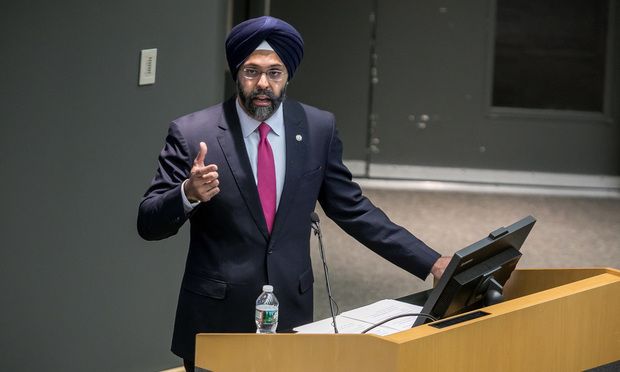Grewal Declines to Cancel Speech at Rider Despite Conflict of Interest Allegation
Grewal was added as a "necessary party" in a lawsuit over Rider University's planned sale of Westminster Choir College.
October 26, 2018 at 05:01 PM
5 minute read
 Gurbir Grewal, New Jersey attorney general, speaking at Seton Hall Law School. Photo by Carmen Natale
Gurbir Grewal, New Jersey attorney general, speaking at Seton Hall Law School. Photo by Carmen Natale
Attorney General Gurbir Grewal has declined to cancel a speaking engagement at Rider University, even after plaintiffs in a suit against the school said his appearance would pose a conflict of interest.
Bruce Afran, the attorney for plaintiffs in McMorris v. Rider University called on Grewal late last month to cancel his scheduled appearance at Rider. Afran had filed an amended complaint naming Grewal as a defendant in the suit, which seeks to halt Rider's plans to sell Westminster Choir College to a Chinese company.
But Grewal said he would not cancel his appearance at Rider. Instead, he told Afran in a letter, he would personally recuse from involvement in the McMorris case.
Rider scheduled “An Evening With Gurbir Grewal” for Oct. 29. Afran said in a letter to Grewal that participating would “inevitably create the appearance that you will be unable to independently discharge your official responsibilities in evaluating whether Rider University is acting illegally in the proposed sale of Westminster Choir College.”
In addition, the independence of Grewal's office would be compromised by his appearance at the event because Rider has applied to the state Department of Education for post-sale licensure of Westminster, Afran said in the letter. The attorney general's office would be called on to advise Westminster if the application were challenged, Afran said.
Afran, a Princeton solo practitioner representing a group of Westminster graduates and other proponents, claims in a lawsuit in Mercer County Superior Court that Rider's pending sale of the choir college violates terms of a 1935 trust that led to the donation of land for its campus in Princeton. He filed an amended complaint on Oct. 18 adding Grewal as a defendant on the premise that he is obligated to supervise charities and charitable funds.
Rider and Westminster merged in 1992. In 2017 Rider said it was ending its relationship with Westminster and would seek a new partner for it. In June, Rider announced a $40 million deal to sell the school to Kaiwen, which has agreed to continue to operate Westminster at the Princeton location for at least 10 years.
Afran's suit seeks a declaratory judgment that the grant of the campus property and other assets to Westminster were subject to a requirement that Westminster continue to operate as a training school for music ministers. The terms of the donation called for ownership of the campus to shift to the Princeton Theological Seminary in the event that Rider or any successor ceases to operate a college for training ministers of music at Westminster, the suit claims.
Grewal was scheduled to speak as part of Rider's Shared Read, in which students, faculty and staff campuswide read the same book, then discuss its themes in a variety of courses and events. The book chosen for the program at Rider is “How Does It Feel to Be a Problem? Being Young and Arab in America,” by Moustafa Bayoumi.
Besides discussing the book, Grewal, who is the first Sikh to serve as New Jersey's attorney general, “will share his own experiences of growing up in New Jersey as the son of Indian immigrants, and how he deals with routine death threats and hate by rising above them with compassion and respect. In July, Grewal earned admiration for the grace and dignity with which he handled radio hosts who singled him out for observing his faith by wearing a turban. He will also discuss his vision for New Jersey to lead the nation in protecting the civil rights of all people,” according to an announcement on Rider's website.
Afran said in his letter to Grewal that “it would be improper for you as Attorney General to attend the Rider University event that headlines you as the featured speaker and builds the event around you personally, reflecting a closeness and consanguinity to Rider University that is inappropriate to your status as the legal officer of the State who must weigh in on and address Rider University's proposed sale of Westminster Choir College. Such participation will create the appearance that you lack independence as Attorney General in violation of the New Jersey Conflicts of Interest Law.”
But Grewal rejected Afran's argument.
“I have carefully considered your request and have concluded that my participation in Monday's program does not constitute an ethics conflict with regard to the McMorris v. Rider litigation or the proposed sale of Westminster Choir College, which is the subject of that litigation. Both the Department of Law and Public Safety's Ethics Liaison Officer and the State Ethics Commission staff were consulted in arriving at this decision and both concur with it,” Grewal said in his letter to Afran.
Grewal added that he was recusing himself from the McMorris case and the Rider sale, even though he was “not required to do so.”
Neither Angelo Stio of Pepper Hamilton in Princeton, who represents Rider, nor a Rider spokeswoman responded to a request for comment.
This content has been archived. It is available through our partners, LexisNexis® and Bloomberg Law.
To view this content, please continue to their sites.
Not a Lexis Subscriber?
Subscribe Now
Not a Bloomberg Law Subscriber?
Subscribe Now
NOT FOR REPRINT
© 2025 ALM Global, LLC, All Rights Reserved. Request academic re-use from www.copyright.com. All other uses, submit a request to [email protected]. For more information visit Asset & Logo Licensing.
You Might Like
View All
Appellate Division Tosses Challenge to Rutgers Board Members That Ensnared NJ Lawyer
5 minute read

From 'Confusing Labyrinth' to Speeding 'Roller Coaster': Uncertainty Reigns in Title IX as Litigators Await Second Trump Admin
6 minute read
Rutgers Taps Lowenstein Sandler to Investigate 'Ugly,' 'Disturbing' Allegations Made by Women's Gymnastics Team
3 minute readTrending Stories
- 1Uber Files RICO Suit Against Plaintiff-Side Firms Alleging Fraudulent Injury Claims
- 2The Law Firm Disrupted: Scrutinizing the Elephant More Than the Mouse
- 3Inherent Diminished Value Damages Unavailable to 3rd-Party Claimants, Court Says
- 4Pa. Defense Firm Sued by Client Over Ex-Eagles Player's $43.5M Med Mal Win
- 5Losses Mount at Morris Manning, but Departing Ex-Chair Stays Bullish About His Old Firm's Future
Who Got The Work
J. Brugh Lower of Gibbons has entered an appearance for industrial equipment supplier Devco Corporation in a pending trademark infringement lawsuit. The suit, accusing the defendant of selling knock-off Graco products, was filed Dec. 18 in New Jersey District Court by Rivkin Radler on behalf of Graco Inc. and Graco Minnesota. The case, assigned to U.S. District Judge Zahid N. Quraishi, is 3:24-cv-11294, Graco Inc. et al v. Devco Corporation.
Who Got The Work
Rebecca Maller-Stein and Kent A. Yalowitz of Arnold & Porter Kaye Scholer have entered their appearances for Hanaco Venture Capital and its executives, Lior Prosor and David Frankel, in a pending securities lawsuit. The action, filed on Dec. 24 in New York Southern District Court by Zell, Aron & Co. on behalf of Goldeneye Advisors, accuses the defendants of negligently and fraudulently managing the plaintiff's $1 million investment. The case, assigned to U.S. District Judge Vernon S. Broderick, is 1:24-cv-09918, Goldeneye Advisors, LLC v. Hanaco Venture Capital, Ltd. et al.
Who Got The Work
Attorneys from A&O Shearman has stepped in as defense counsel for Toronto-Dominion Bank and other defendants in a pending securities class action. The suit, filed Dec. 11 in New York Southern District Court by Bleichmar Fonti & Auld, accuses the defendants of concealing the bank's 'pervasive' deficiencies in regards to its compliance with the Bank Secrecy Act and the quality of its anti-money laundering controls. The case, assigned to U.S. District Judge Arun Subramanian, is 1:24-cv-09445, Gonzalez v. The Toronto-Dominion Bank et al.
Who Got The Work
Crown Castle International, a Pennsylvania company providing shared communications infrastructure, has turned to Luke D. Wolf of Gordon Rees Scully Mansukhani to fend off a pending breach-of-contract lawsuit. The court action, filed Nov. 25 in Michigan Eastern District Court by Hooper Hathaway PC on behalf of The Town Residences LLC, accuses Crown Castle of failing to transfer approximately $30,000 in utility payments from T-Mobile in breach of a roof-top lease and assignment agreement. The case, assigned to U.S. District Judge Susan K. Declercq, is 2:24-cv-13131, The Town Residences LLC v. T-Mobile US, Inc. et al.
Who Got The Work
Wilfred P. Coronato and Daniel M. Schwartz of McCarter & English have stepped in as defense counsel to Electrolux Home Products Inc. in a pending product liability lawsuit. The court action, filed Nov. 26 in New York Eastern District Court by Poulos Lopiccolo PC and Nagel Rice LLP on behalf of David Stern, alleges that the defendant's refrigerators’ drawers and shelving repeatedly break and fall apart within months after purchase. The case, assigned to U.S. District Judge Joan M. Azrack, is 2:24-cv-08204, Stern v. Electrolux Home Products, Inc.
Featured Firms
Law Offices of Gary Martin Hays & Associates, P.C.
(470) 294-1674
Law Offices of Mark E. Salomone
(857) 444-6468
Smith & Hassler
(713) 739-1250






